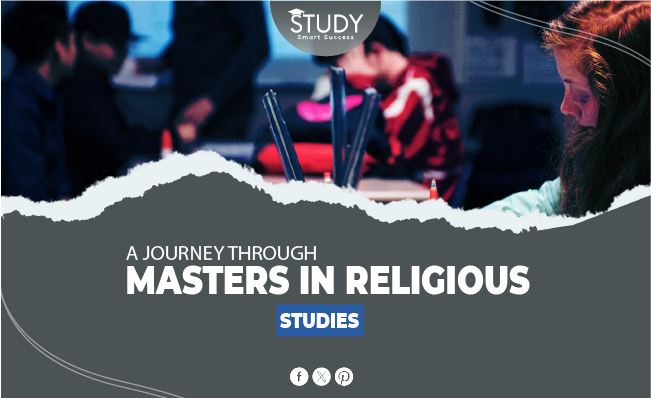A Master’s in Religious Studies illuminates human faith, ethics, and how religion influences civilizations at a time when understanding our world’s cultures and values is more important than ever. The Master’s in Religious Studies is a thorough handbook for students, instructors, and professionals. It details how to get one and why it may be the key to heavenly and human mysteries.
What is a Masters in Religious Studies?
A Master’s in Religious Studies emphasizes interdisciplinary religious research. Unlike theology programs that teach ministers, this degree encourages critical, non-religious analysis of religious occurrences in different religions, places, and times. The school seeks to deepen understanding and respect for Christianity, Islam, Hinduism, Buddhism, and other lesser-known religions.
Why Pursue a Masters in Religious Studies?
A Master of Religious Studies is more than an academic aim; it can lead to many career and personal growth opportunities. With this degree, people interested in the complex relationships between religion, society, and culture learn to evaluate religious declarations, beliefs, and practices critically.
When students graduate, they are very well prepared for jobs in education, non-profits, public policy, or even conflict resolution, all of which require a deep understanding of how religion affects people’s behavior.
This degree also gives people the tools they need to have meaningful conversations with people of other faiths, which promotes tolerance and understanding in societies that are becoming more international and diverse.
Who Should Pursue a Masters in Religious Studies?
This class is perfect for people interested in the world’s religions, their origins, and how they have affected modern problems and global cultures. It speaks to:
- People who want to get better grades in religion studies or similar subjects.
- People who work as teachers want to improve their lessons and skills.
- Scholars and experts mainly worked on studies that combined different fields, like religion, society, sociology, and history.
- People in foreign relations, public policy, or non-profits want to learn more about how religion affects life worldwide.
- People interested in volunteering in religious groups also want a bigger, more academic view of faith.
- This course is for journalists and writers who want to learn more about how religion affects news and events worldwide.
- Lawyers and other legal experts are interested in how the law, human rights, and faith freedoms interact.
- People who work in health care want to be more sensitive to religion and cultural differences.
- Anyone who wants to learn more about the intellectual questions and moral problems that different religions raise.
The Structure of the Program
A typical Master’s in Religious Studies takes two years, including classes and study. The program will give students a broad understanding of the world’s major religions and the critical thinking skills they need to examine religious texts, practices, and beliefs. Often, essential parts include:
- Core classes are on how to learn religion and how to think about it.
- Some electives focus on different faiths, regions, or themes, such as religious ethics, atheism, and spirituality in modern society.
- You can study languages related to what you want to learn, like Sanskrit for Hinduism studies or Arabic for Islamic studies.
- A thesis or final project that is based on the original study.
- There may be fieldwork or internships available where students can put their classroom knowledge to use in real life.
- These could be with neighborhood groups, religious institutions, or schools.
- Seminars and guest talks from top researchers and practitioners in the field give students a look into the latest work and arguments in religious studies.
- Attending academic workshops and symposiums allows students to share their study results, connect with pros, and learn about new trends.
- Opportunities to work with groups from other fields, such as anthropology, history, psychology, and sociology, make school more fun and open up new study ideas.
- Access to large library sets and internet tools that focus on holy writings, objects, and academic work helps with in-depth study projects.
Career Pathways
Masters in Religious Studies graduates can work in many different areas, which shows how flexible the degree is. Some possible job paths are:
- Academia and Education: Either teaching at the high school or college level or getting a Ph.D. to do academic study and teach at the college level.
- Non-Profit Sector: Working with religious groups, cultural institutions, or NGOs that promote discussion between religions, do community work, or help people in need.
- Public Policy and International Relations: Advising on religious problems that affect policymaking or helping to build peace and settle conflicts in places where people of different faiths live together.
- Media and Publishing: Writing or collecting material about religious topics, religious settings in the past, or covering religion news.
- Cultural Heritage and Museum Work: Keeping religious objects, writings, and historical places safe, interpreting them, and putting them on display; giving people information about the historical aspects of faith practices.
- Legal and Human Rights Fields: This field specializes in cases involving religious freedom, discrimination, and how the law and spiritual practices affect each other.
- Healthcare and Chaplaincy: Giving spiritual care in jails, hospitals, the military, and the community based on each person’s unique spiritual needs and background.
- Corporate Ethics and Diversity Management: Helping businesses make workplaces that are welcoming and respectful of religious differences, as well as dealing with ethics problems in the business world.
- Consultancy Services: Helping companies go global by advising them on religious markets, cultural knowledge, and how to communicate with people from other cultures.
Why Pursue a Masters in Religious Studies?
They think critically about and understand the religious effects of politics, social justice, and foreign issues, which are vital today. A Master’s in Religious Studies gives people the knowledge and understanding they need to contribute to the discussions and answers about these world problems.
It also helps people develop a deep understanding of the wide range and variety of human beliefs. This builds a sense of global patriotism and sensitivity that is very important today.
Admissions Requirements and Application Process
To get into a Master in Religious Studies school, applicants usually have to undergo a lengthy application process that checks their academic experience, intellectual curiosity, and readiness for graduate-level study. Important parts of the application are:
- Usually, a bachelor’s degree from an approved school with a certain GPA is needed. A degree in religion studies or a similar area is helpful, but many schools accept candidates from various academic backgrounds.
- Official papers from all colleges and universities you’ve attended after high school.
- Letters of reference, usually from teachers or academic advisors who can speak to the applicant’s academic skills and ability to do well in graduate school.
- A letter of purpose explaining why the candidate wants to join the school, what they want to do with their job, and how they are interested in religious studies.
- Some programs might need writing samples or a resume or CV that shows off related work, school, and community experiences.
Foreign applicants may need to take the TOEFL or IELTS to demonstrate their English speaking and writing skills. Students should study and prepare early to ensure a smooth college application process because institutions have varying deadlines and standards.
Embarking on Your Journey
A master’s in religious studies can help people interested in faith’s mysteries view the world differently. Students study religious practices, texts, and beliefs to better understand and appreciate people from other religions and civilizations.
People who desire to study should research Masters in Religious Studies programs to choose one that meets their academic interests and career aspirations. For those interested in ancient religious texts, modern spiritual groups, or the intersection of religion and public life, this master’s program will take you on a profound and illuminating journey into the heart of humanity.
A Master’s in Religious Studies helps you improve your grades and study how religion has shaped nations and civilizations. This degree interests me since it’s interesting how religions interact.



